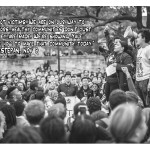by Nicole Chavez
On Thursday, February 18th, the International Students’ Organization hosted an event called Race in Global Context. During the two-hour long event held in Linsly Chittenden Hall, about fifty students listened in on three panels in which international students along with faculty discussed the various racial dynamics found in spaces outside of the United States. The panels were titled as follows: “Race and Identity,” “Majority and Minority Race,” and “Who has a say in racial issues?”
To begin, students in the “Race and Identity” panel were asked the following question: Do international students qualify as people of color (POC)? In stating that they do not identify as people of color, students Ho Kyeong Jang and Daniel Silverman broached the question of whether or not the label people of color functions predominately as a political identity or a cultural identity. Jang asserted that the label of POC is one that an individual chooses to claim.
Professor Albert Laguna, American Studies professor and D.U.S. of the Ethnicity, Race, and Migration program offered an opposing view, proposing that there is a substantial difference between an individual’s self-perception and the way in which others label that individual. Therefore, many racial minorities in the U.S. lack the autonomy of whether or not POC is a label they wish to claim.
As the conversation progressed, the focus shifted to the way in which ironically, the term POC can be considered to be exclusive by some. Many students of color at Yale use the label “POC” because they view it as a label of solidarity. However, Jang suggested that there is an inherent Americanness to the term person of color.
Jang purports the example of his home in South Korea. He explains that since nearly everyone living there is Korean, it is unnecessary to discern a characteristic (i.e.; the Koreans being “of color”) that is typically a commonality in this context. More often than not, Jang asserted that he and other international students at Yale claim the label of minority instead. To them, the label of minority seemed to serve as more realistic and practical of a label since it was a judgment on number. But as was discussed in the second panel, there exists a significant distinction between number and presence, and the political and cultural power derived from that presence.
The dynamic of the first panel reflected the present and ongoing conflict between some students of color and international students at Yale. There are preexisting connotations to many of the labels that people of color at Yale have reclaimed that misconstrue many international students’ understanding of the Next Yale Movement. What these individuals fail to recognize are the multiple ways of interpreting this “Third World” connotation that one panel suggested permeates the POC label.
In “Majority and Minority Race” several students from Africa representing Sudan and South Africa discussed how in places outside of the U.S., other identifiers such as tribal affiliation or geographical area can play a more important role in demarcating majority and minority communities in countries that are more racially homogenous than the U.S. In these cases, or in the case of whites in South Africa, there are groups that are, in terms of number, the minority yet still come to oppress the near entirety of a country.
Graduate student and panelist Thutho Thipe attempted to offer an abridged explanation of how such illogical power dynamics are established. Thipe discussed how mutual reinforcement of oppression occurs on part of both the government and general populous when the government plays on informal systems of exploitation and deriding sentiment that exists within a culture towards particular groups.
Emi Mahmoud contributed to the conversation by offering the example of the genocide in Darfur. In Sudan, geographic tension between the North and South and more specifically between the ethnically Arab Janjaweed and ethnically African southern Sudanese allowed the Sudanese government to collude with the North to uphold the oppression against the natives to Southern Sudan, a group that is not technically a minority in size. The panel ended with an insightful pointed made by Mahmoud, that power in numbers is not synonymous to power in cultural presence. In many cases, power is not tangible and effective for reform unless, it is deemed so by white standards.
The last panel of the night, “Who has a say in racial issues?” had Yale students think about the role of domestic and international students in the conversations that have been proliferating across campus since November. The three international students on this panel admitted to feeling, or at least witnessing, dissonance between international students who are perceived as POC and domestic students who claim the label of POC.
One student from Swaziland, Wabantu Hlophe, asserted that many of the students in YASA, the Yale African Students Association, have different concerns and needs that need to be addressed than the African American students in Yale Afro-American American Cultural Center. He elaborated that he believes the tension arises from an expectation imposed on both groups to have nearly identical experiences and feelings at and towards Yale.
Yi-Ling Liu, a student from Hong Kong, offered one possible means of ameliorating this conflict. As an English major with a passion for creative writing, Yi-Ling considers fiction to be the most effective venue through which to create connections. Ewurama Okai presented a similar solution, proposing that drawing parallels between your own life and that of another individual can give you the proper insight on how best give advice and support a friend in need. They key, Yi-Ling stated, is “to acknowledge differences and create sympathy.”
The ISOS Race in a Global Context event was successful in providing a space for international students to discuss their thoughts about race, specifically at Yale.
Notably lacking from the event; however, were domestic students. Whether domestic students who identify as POC should have been in attendance and listening along with other audience members or discussing racial dynamics along with the international students speaking at the panel is up to the ISO to decide. However, if students who are a part of the Next Yale Movement truly do want to see substantial change made on all fronts for students at Yale, then they need to show up, even when they are not necessarily doing all of the talking and even when they do not necessarily agree with their peers.


